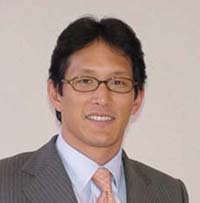Interview with Cybird President- Kazutomo Robert Hori
Back to Contents of Issue: April 2002
|
by Steve Myers |
|
 Can you briefly describe Cybird's origins and business? Can you briefly describe Cybird's origins and business?
Cybird was founded in 1998 with an initial staff of five people. From the beginning, our mission has always been to pioneer the development of the mobile Internet. We were the first content provider to create content for the i-mode platform, and have been closely involved in its expansion. We now have over three million subscribers to our content services. At present, we are working hard with wireless network operators overseas to help ensure the successful launch of the mobile Internet in other countries. What kinds of things are you doing with the foreign operators? One thing we're doing with several GSM operators is providing consulting services. Even though this is actually very time consuming and labor intensive, we feel it is important in order to see good growth overseas. Helping the operators to increase the number of subscribers gives us the chance to earn higher revenues with our content. Also, by working closely with the operators, we may be able to help them come up with some kind of platform solution. Is Cybird also involved in the development of mobile platforms? DoCoMo made the most money from i-mode because it provided the base platform, so all of us want to provide a platform, which we are aiming to do for the GSM network. What kinds of content will you provide initially to the overseas markets? Ringtones and logos. Because we've been so closely involved in i-mode content production for so long now, we know what sells and what doesn't sell. When and where are you planning to start offering the ringtones and logo content? Well, it was recently announced that there is going to be i-mode in Germany on the E-Plus network starting from March, and there will also be i-mode in the Netherlands, provided by the KPN group. They support not only the technology, but also the business model, complete with the billing service and packet network. Although we're not allowed to say whether or not we have official approval with certain operators, I can say that we are willing to provide contents wherever i-mode goes. Right now, I can just say that we are talking to operators in several European and Asian countries. What are your main strengths in terms of mobile technology? The primary one is the knowledge and experience of our subsidiary KLaboratory, in developing mobile Java applications. How will Java and other technology figure in Cybird's activities overseas? It's funny - many European companies are discussing launching Java on GSM, which doesn't seem to make sense. In Japan, Java for the phone is just another way to enhance the original i-mode. If you don't have an original i-mode, Java is not necessary. In the GSM territory, if you don't have anything working properly with plain HTML you won't be needing fancy graphics or Java applications. Perhaps even more importantly, KLab has recently partnered with a European SIM card manufacturer, Gemplus S.A. Whereas Java technology operates on a very high level, the SIM card technology is at a much lower level, so in some sense you could say we are working on both technology fronts. We feel that with this partnership, all of the pieces are in place for us to make a significant contribution in the platform arena. What is attractive about Cybird from the standpoint of an investor? First, we have very stable revenue growth: 10 percent quarterly. We are profitable and the content business for Cybird is very predictable and steady. This presently makes up 85 percent of our total revenues. In addition, there is tremendous potential in other parts of our business. This includes providing mobile business solutions, licensing technology through K-Lab, and also our international activities. These activities are a little more 'high risk, high return', but I think we have a very good chance, and we will never neglect our content business, which is our bread and butter. What type of investor are you trying to find for Cybird? I want investors who can understand the true meaning of what we are doing. This is very difficult, and requires knowledge of technology, platforms, many different industries, the network business, and a very deep intelligence of other industry players in relation to the cellphone. I want investors who are clever and able to understand the Cybird fight. Where do you see Cybird this time next year? I announced at the beginning of this year to all 150 employees of the company that I will be staking my life on this coming year, because I see very big change and very big opportunities for this industry. I think this is the key year, and where we are next year depends on how we respond to the big challenge of this year. In particular, what do you see happening this year? The strength of the mobile Internet has finally been acknowledged by other industries outside of the telecommunications industry, both in Japan and elsewhere. So players from many different types of media and network industries -- broadcasting, cable, print media, game networks -- will be trying to merge the mobile industry into their own. This means that the money size of this industry is going to change completely as these various media types and networks merge, and everybody wants to be the one taking initiative and calling the shots. Not many Japanese players are aware that we are about to move from a closed network to a much bigger, open network. If we are able to succeed in this battle to lead the larger, merged network, we will be in a very strong position, and most of my time this year will be used for that purpose. |
|
Note: The function "email this page" is currently not supported for this page.





